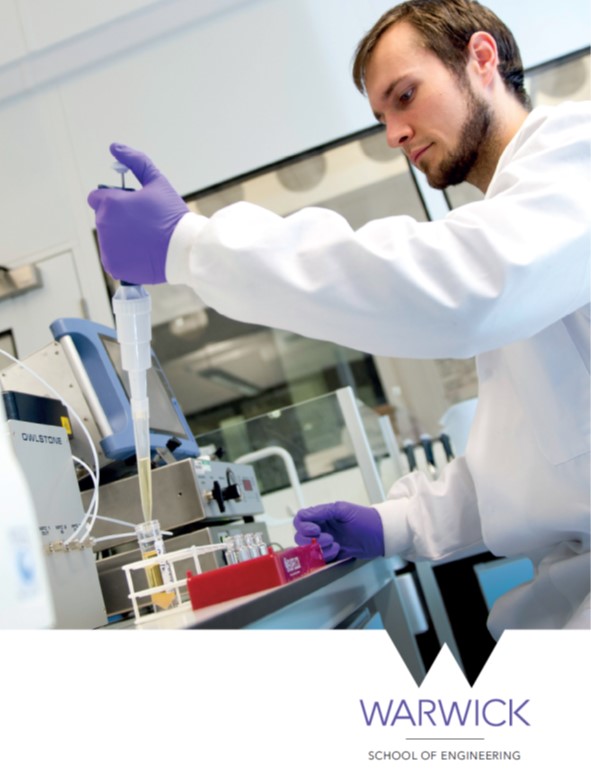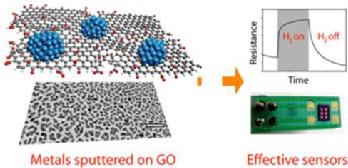Current Projects
The Biomedical Sensors laboratory undertakes a range of different projects, both medically and non-medically related. The lab has previously recieved funding from a broad spectrum of funding sources, including EPSRC, EU, TSB, Industrial and charities. An important aspect of the work undertakn in the BSL is that currently work is being undertaken in the field of sensors/sensor materials, sensor systems, electronic noses, software analysis and applications. Thus we undertake a broad remit of activities. Current research projects include:
- Medical Studies - The use of electronic noses to detect gas phase biomarkers
- Plant diseases - Detection of gas phase bio-markers of plant diseases
- Industrial applications - Use of electronic nose instrumentation to replace human panels
- Electronic Nose Development - New generation of Warwick Electronic Noses (WOLF)
- Graphene Oxide Chemical Sensors - Novel sensors employing catalytic doped reduced graphene oxide
- Metal-Oxide Sensors - Development of new commercial metal-oxide gas sensors
This lab works in closely with the Plastic based Micro-fabrication facility and the Microsensors and Bioelectronic Laboratory.
Medical Studies
One of the main focusses of the work undertaken in the Biomedical Sensors Laboratory is in the detection of gas phase biomarkers emanating from human waste. Our current activities cover a broad spectrum of different diseases and sample types, including urine, breath, stool and blood. Listed below are some of the different diseases we have investigated:
- Bile acid malabsorption (urine)

- Clostridium difficile (stool)
- Coeliac's disease (urine)
- Colorectal Cancer (urine)
- Crohns disease (breath, urine and stool)
- Diabetes (urine)
- Hepatic encephalopathy (breath)
- Irritable bowel syndrome (urine and stool)
- Liver disease (urine and breath)
- Obesity (urine)
- Pelvic radiation recovery monitoring (stool)
- Pre-term labour (vaginal wipe)
- Tuberculosis (breath)
- Ulcerative colitis (breath, urine and stool)
We work closely with University Hospital Coventry and Warwickshire who are our main collaborators, but also the Royal Marston in London, Glenfield Hospital in Leicester and the Royal Hospital in Liverpool. We have full ethical approval for all the studies with more than 1,000 samples stored for future work.
Plant Diseases
 This project, joint with the School of Life Sciences and funded by the UK potato council, is to investigate gas phase bio-markers for potato infections. It intention is to develop new and novel means of rapid indentfying potato diseases at an early stage - particularly important in storage applications. It is hoped that this will lead to improved storage yields and reduced wastage.
This project, joint with the School of Life Sciences and funded by the UK potato council, is to investigate gas phase bio-markers for potato infections. It intention is to develop new and novel means of rapid indentfying potato diseases at an early stage - particularly important in storage applications. It is hoped that this will lead to improved storage yields and reduced wastage.
Currently, the team is also looking at a range of other applications for this technology, with a specific focus on superfoods.
Industrial Applications
We regularly take on industrial work to evaluate the effectiveness of electronoc nose technology to their applications. The range of activities is consdierable. For example, we have worked with a major car manufacturer to investigate the possibility of reducing the need for human panels to test the odours coming from car interiors. It is hoped that this will allow more screening of car interiors on the production line and speed up the testing of new car parts before they are used. Please see our Commercial Services webpage for more details.
Electronic Nose Development
The University of Warwick has been a centre of excellence for electronic nose development for more than 20 years. The BSL continues to develop and apply a range of new electronic nose instruments to a broad spectrum of applications. These new electronic noses are named "WOLF" or "Warwick OLfaction". More infrormation about these instruments can be found at the dedicated webpage on this site.
Graphene Oxide Chemical Sensors
 An important aspect of the BSL is the development of new materials for gas phase chemical sensors. In collaboration with Dept of Physics and Alphasense, our group are developing a new range of chemical sensors based around reduced graphene oxide. These sensors can be produced at low cost and in large numbers. Here layers of graphene oxide are doped with a catalytic material - such as palldium, to form a chemoresistive gas sensors. This catalytic material endows significant performance enhancements over simply the graphene, providing high selectivity and sensitivity to (in this case) hydrogen. The group are currently looking into a range of different dopants to provide selectivity to a range of target gases.
An important aspect of the BSL is the development of new materials for gas phase chemical sensors. In collaboration with Dept of Physics and Alphasense, our group are developing a new range of chemical sensors based around reduced graphene oxide. These sensors can be produced at low cost and in large numbers. Here layers of graphene oxide are doped with a catalytic material - such as palldium, to form a chemoresistive gas sensors. This catalytic material endows significant performance enhancements over simply the graphene, providing high selectivity and sensitivity to (in this case) hydrogen. The group are currently looking into a range of different dopants to provide selectivity to a range of target gases.
Metal-Oxide Sensors
In addition to working on graphene gas sensors, the group is supported by industry to develop new generations of metal-oxide based chemical sensors. These sensors are designed specifically for the harsh environments of the oil and gas industry. These new sensors will be shortly in manufacture and will be available with the next 6 months.
